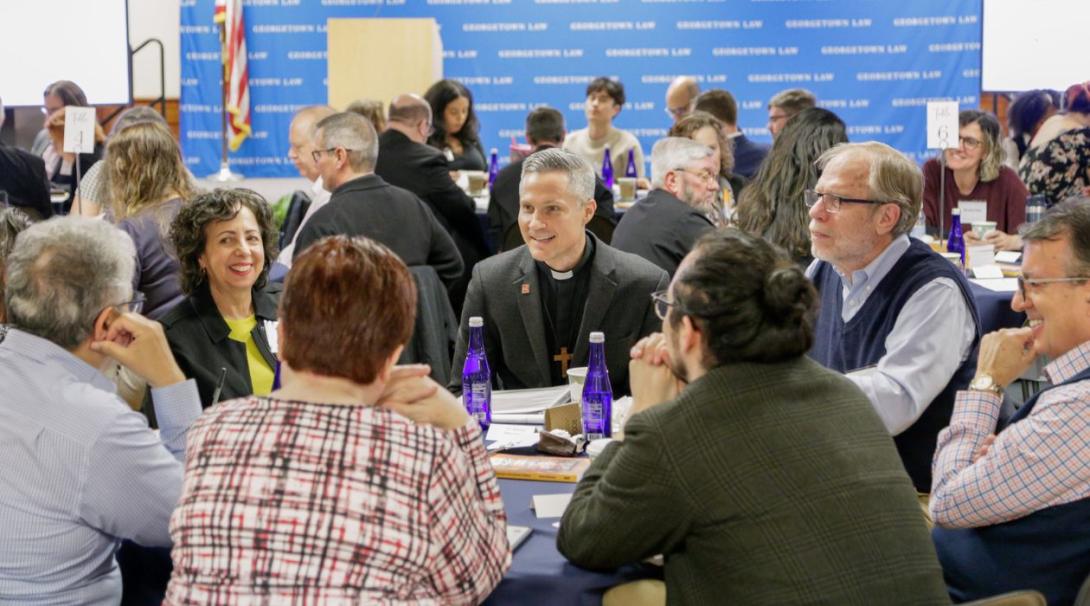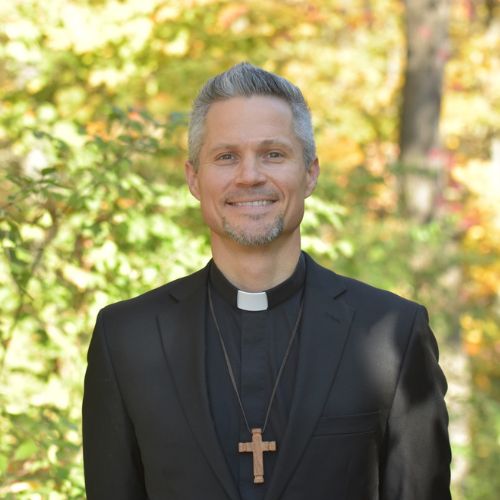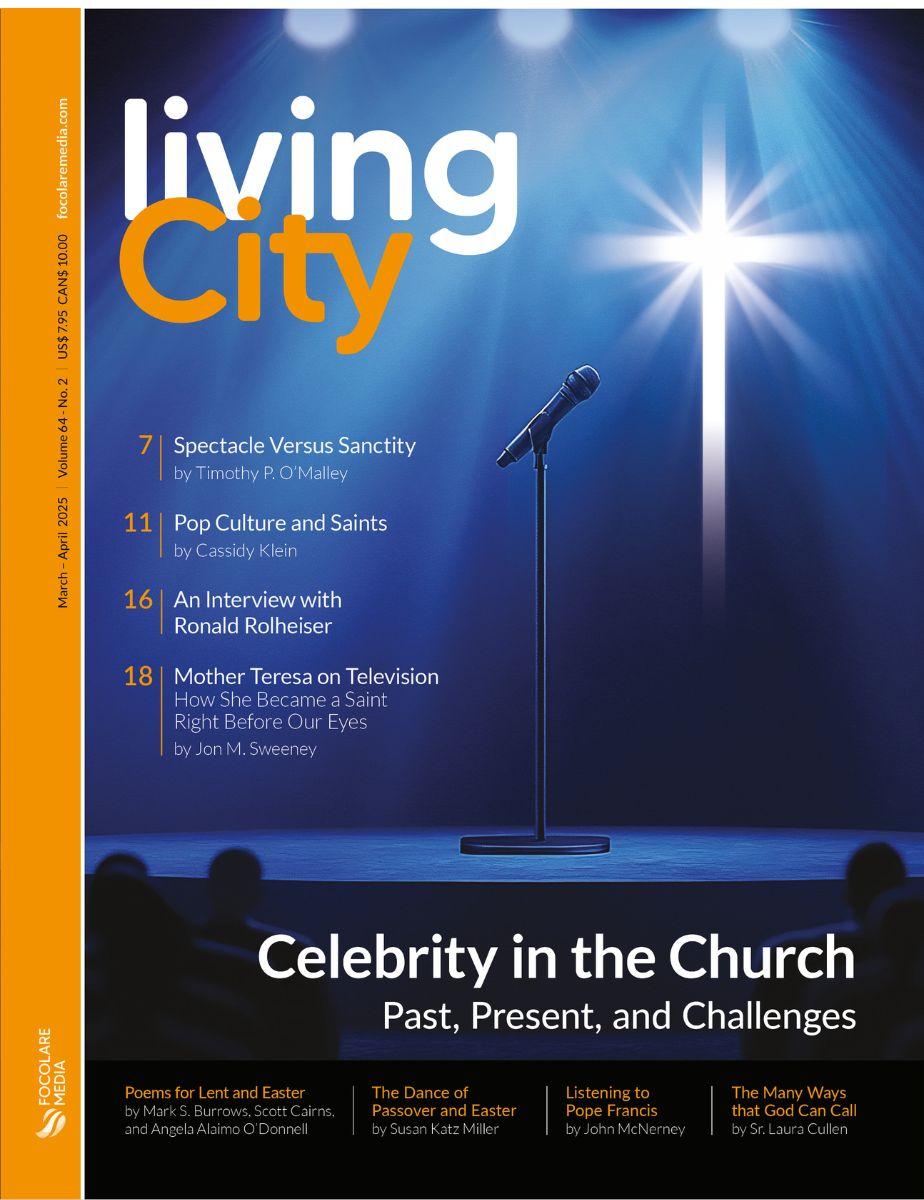
Fr. Aaron Wessman engaging in a table discussion about polarization at Georgetown University | Photo provided by Georgetown University
For over a year, as part of a book tour, I have been traversing the United States, talking to numerous groups—including one gathered at Georgetown University in late February—on the interconnected themes of Christianity, politics, and polarization. Audiences at these events have been quite diverse: religiously, politically, and culturally.
One trend that has emerged from these engagements, however, leaves me genuinely curious. Those who are “conservative leaning” do not appear to be as involved in addressing the theme of polarization or in exploring the possibility of “building bridges” as, say, their more progressive counterparts.
To be sure, there are exceptions to this observation, which the gathering at Georgetown provided. Many conservatives are deeply concerned about negative polarization and invested in building bridges. But the lack of enthusiasm from the conservative demographic is a trend I notice throughout the United States, nonetheless.
What also is telling is that other bridge-building organizations echo my observation. For instance, Braver Angels—a non-partisan, national organization that seeks to bridge divides between self-identifying “reds” and “blues”—noted during their last national gathering that it is sometimes challenging for them to find sufficient “reds” to attend the events they hold.
Now, I do not have a robust explanation for this trend. Perhaps conservatives prefer a different metaphor to deal with polarization. They may question: “Why build bridges when walls or bastions seem more prudent, especially given the perceived radical differences existing between the political-cultural ‘tribes’ of the United States?” This is an important question to wrestle with, to be sure.
But it seems progressives and moderates would be just as justified in thinking similarly (and, of course, some do), and so this does not seem to explain sufficiently the pattern I notice.
It might be that conservatives feel severely misunderstood by their counterparts and suspect they will not be welcomed if they cross over. Again, this is a genuine concern, and one that some conservatives have expressed to me.
But the perception gap between tribes exists on both sides, and no group is immune from the potential of rejection or hostility when engaging the “other.”
Many conservatives are deeply concerned about negative polarization and invested in building bridges.
Though I cannot answer thoroughly this question here, I want to explore why I think “conservative-minded” people should be animated to engage the task of building bridges to those who see the world differently. I do so as one who shares more than a few cultural identity markers with the conservative coalition, even as my profession as a priest precludes me from expressing a partisan preference. And I do so out of respect for many conservative-leaning friends (and others) who contribute much to improving the cultural situation of the United States.
First, from a philosophical perspective, the very notion of being “conservative” means seeking to preserve those good things of society and culture that are beneficial, laborious to create and maintain, and all-too-easy to destroy. On this notion of conservatism, the late philosopher Roger Scruton (1944-2020) wrote: “The conservatism I shall be defending tells us that we have collectively inherited good things that we must strive to keep.”
If this definition captures, at least in part, conservatives’ own self-understanding, it provides a few reasons in support of bridge-building.
The first and most apparent is linked to the fact that the United States is close to the precipice. Rising numbers of people desire the union to break. If there is anything “good” worth preserving in this country, then a broad, politically and culturally diverse coalition—including conservatives—will be needed to walk the country back from the cliff.
What is more, bridge-building presents unique opportunities to practice “conservation.” On the one hand, only by crossing over to their political-cultural interlocutors will conservatives likely be able to receive from them, and so be able to preserve with them, what is good and true in their perspectives and way of life.
On the other hand, bridge-building also provides conservatives an opportunity to share the richness of their own perspectives with those who may not have encountered, or perhaps otherwise would not have the opportunity to encounter, their ideas. Part of conserving what is good requires sharing that good with others such that they can choose, if they desire, to preserve it as well.
What is more, bridge-building presents unique opportunities to practice “conservation.”
The second reason in favor of conservative bridge builders flows from the first. The Christian tradition, which, statistically speaking, most people in the conservative camp identify with, is replete with figures who were exceptional bridge builders and “preservationists” of tradition.
Take, for instance, the Christian intellectual and priest, Thomas Aquinas (1225-74). During Thomas’ time, it was quite taboo in ecclesial circles to engage the writings of the philosopher Aristotle (384-322 BC). Platonic philosophy had been the dominant influence in Christian thought for over 1,000 years, and many felt it should remain so. Yet Thomas, even while facing rejection from his peers and potential expulsion from the academy, built bridges to the truths Aristotle offered and wove this wisdom into his articulation of the Christian tradition. His Aristotelian-influenced Christian thought remains an intellectual treasure to this day.
Of course, Aquinas was motivated by the example of Jesus himself. Here we find another basis for building bridges.
Jesus’ entire ministry is incomprehensible unless it is seen as a ministry of “crossing over” to engage the outsider or “strange interlocutor.” Jesus engaged lepers, sinners, his antagonists, those rejected by society, and even those who sought to harm him. To be sure, “bridge-building” was one aspect of his engagement with those around him, but he nevertheless consistently interacted with the “out-group.”
If conservative-minded people in the United States hold Jesus of Nazareth as the model for their lives (and I understand there are exceptions to this), it seems that bridge-building cannot be ignored as a necessary practice.
And this brings me to the final point. Conservative-minded people should consider bridge-building for the very reason that some of the most compelling conservative voices today are those who consistently place themselves among people who see the world differently, often doing so with genuine interest and curiosity.
Though I am not placing him on the same footing as Aquinas, or heaven forbid, Jesus, Ross Douthat, a conservative columnist for the New York Times, is quite arguably one of the more insightful and intriguing members of the conservative coalition precisely because he consistently practices a life of “crossing over the divide.”
If conservative-minded people in the United States hold Jesus of Nazareth as the model for their lives (and I understand there are exceptions to this), it seems that bridge-building cannot be ignored as a necessary practice
Douthat conducts his work around the coastal intelligentsia, a stereotypically progressive group, and is a stable presence in one of the leading progressive-leaning media outlets from New York. Douthat also demonstrates his bridge-building prowess in his willingness to be, quite often, a lone conservative voice on podcasts or in interviews. He even explores in his own writing the value of “non-traditional” medicines, the meaning behind avant-garde spiritual practices, and the wisdom of his cultural interlocutors with whom he sometimes disagrees.
And he does this, all-the-while, as a leading conservative thinker today.
Preserving the goodness of the United States and overcoming the multitudinous divisions affecting nearly every area of society will require a diverse cohort. Conservatives are not only welcome; they are needed! And they have many reasons, flowing from their own self-understanding, to be bridge builders.
This essay was originally published on the Berkley Forum, an online platform for public scholarship and informed commentary from the Georgetown University Berkley Center for Religion, Peace, and World Affairs.
If you enjoyed this article, you might like...














